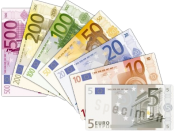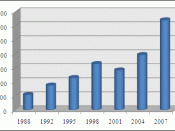This essay is intended to evaluate the impact of the European single currency since its inauguration on 1st January 1999. In part a) I will identify and explain the impact of the Euro since its introduction on the foreign exchange, bond, equity and Eurocurrency markets. Part b) will concentrate on the implications of change on differing groups of participants or potential participants in these markets.
PART A
The Foreign Exchange Market
The disappearance of 12 sovereign currencies and the increased mergers and acquisition between Euro zone banks instigated by the introduction of the Euro has led to a reduced volume in trade within the foreign exchange market (as the number of participants and the markets they trade across decreased).
Foreign exchange average daily turnover has also declined, from 1998 figures of $1.4bn to 2001 figures of $1.2bn [Joshua Rosenberg - Federal Reserve Bank of New York (2002)] , although it is quite probable that other factors such as the economic downturn and mergers & acquisition (M&A) activity (which may compensate by increasing market liquidity) are in part responsible for such a decline in figures.
Various studies have been undertaken regarding the influence of the Euro, with the overall conclusion being that the behaviour of the Euro, in terms of bid-ask spreads, volatility and trading activity correlates to that of the Deutsch mark.
Statistics obtained from the Bank of International Settlements (BIS) showed that since the introduction of the Euro the dollar has slightly strengthened its position as the global vehicle currency (used when central banks wish to intervene in the market), being accountable in 91% of all foreign transactions. The Euro presence existed in 38% of trades (30% of which were trades against the dollar), slightly gaining on the total sovereign currency presence that used to exist.
Since Jan 1st...


